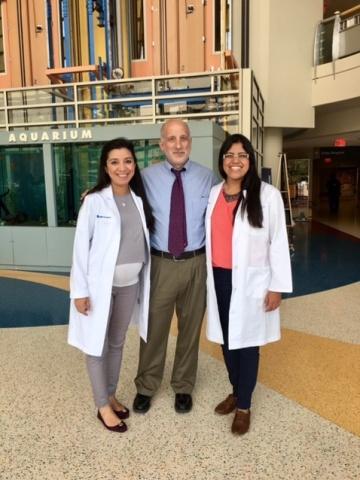
Photo: Henry Rice, MD, with Safety and Quality fellows Carla Ramírez, MD, Sindy Mendez Soveranis, MD, during the fellowship training at Duke in September 2017
The feature story of the Fall 2017 Duke Surgery Newsletter highlighted several of the Department’s global initiatives, including the Safety and Quality Training fellowship program led by Henry Rice, MD, Chief of Pediatric General Surgery. The aims of the fellowship were to assess and influence safety culture at Roosevelt Hospital in Guatemala City through a training curriculum for local physicians.
After receiving training at Duke in September, the first two fellows from the program, Sindy Mendez Soveranis, MD, and Carla Ramírez, MD, have since returned to Roosevelt, where they have begun to implement practices to improve pediatric care. Dr. Rice and his team, including Clinical Research Coordinator Bria Johnston and DUH Patient Safety Director Judy Milne, have continued to provide mentorship, and Dr. Rice reports that positive changes are taking place.
“Dr. Mendez is taking a leading role at the Pediatric Nephrology unit, and has already implemented key safety tools in response to the health survey data,” Dr. Rice says. “In particular, she has led a morning briefing policy, by which all team members work together to organize each day. It has markedly improved their team communication, and should lead to improved outcomes.”
The program has been successful largely due to sponsorship from FUNDEGUA, an organization whose mission is to aid culturally sensitive research in Guatemala. Gabriela Asturias, co-founder and president of the organization, says she hopes the support for Drs. Soveranis and Ramírez will be a catalyst to create systemic change.
“The importance of the Safety and Quality Training fellowship with Duke is that it enables us to create internal leaders within the health system in Guatemala, rather than leadership from an outside entity,” Asturias says. “The results are more dynamic and adaptable when it comes internally. The fellows from the program have already met with the nursing team to discuss medical errors and address making simple changes in behavior.”
FUNDEGUA supported the fellowship by providing tuition and airfare for Drs. Soveranis and Ramírez to travel to Duke. To be sustainable, Asturias notes that the program needs continued support in two areas.
“We support research-based initiatives and fund projects that create long-lasting change,” she says. “In order for this fellowship to be successful long-term, we need to continue to raise funds to send more fellows to Duke for training, and we need to increase support within Roosevelt Hospital. Many of the changes within the hospital do not require money—they are structural and behavioral.”
The continued training of medical professionals from Roosevelt Hospital will create an environment supportive of these changes, but Asturias says that finding funding has been challenging.
“Projects that create systemic change are difficult to fundraise. We are working to improve the internal climate and attitude of a hospital. It is a result that can be measured over time, but donors frequently like to see an immediate reward for their investment.”
FUNDEGUA is committed to overcoming these challenges in continued support of the fellowship program, which will soon spread to other hospitals. In May 2018, Dr. Rice’s team will return to Guatemala to help lead a teaching conference on Executive Leadership, Safety, and Quality, to disseminate the program to other health centers in the country and open the door for a new group of fellows to be trained.
FUNDEGUA
To learn more about FUNDEGUA and the programs it supports, please visit their website.